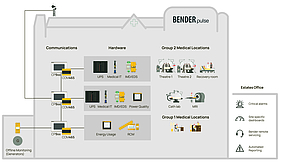Bender UK, a leader in smart, safer and more sustainable energy solutions, has launched Bender Pulse, a cloud-connected condition monitoring based service solution that is designed to give estates teams 24/7 visibility of critical medical power systems, energy use and electrical fault development across healthcare environments.
The solution addresses the critical gaps in traditional electrical monitoring that can leave developing faults undetected for weeks, until they cause emergency callouts and operational disruption. With the Building Engineering Services Association calculating £400 million could be saved annually through smarter energy management, healthcare estates face mounting pressure to move beyond reactive maintenance approaches.
Healthcare estates currently manage £12.4 billion in annual energy costs while facing stricter compliance requirements. SECR and ERIC reporting demands evidence-based data, not box-ticking exercises, while Green Plans require board approval and measurable progress toward net-zero targets.
Gareth Brunton, managing director of Bender UK, said: "UK and Irish healthcare estates are under enormous pressure to find that projected £400 million in savings while maintaining day-to-day patient safety and service continuity.
“The cost of reactive maintenance is becoming unsustainable. Healthcare estates face rising energy costs, tighter compliance requirements and infrastructure that cannot afford to fail. Pulse converts existing data points into actionable intelligence, supporting immediate maintenance needs and long-term objectives."
By combining residual current monitoring, insulation fault prewarning and mitigation, power quality analysis and energy measurement through the POWERSCOUT® cloud interface, Pulse aggregates data flows for secure dashboards that are easily accessible to estates teams, providing early warnings before faults become failures, or automated reports capturing any degradation.
Recent trials have validated the platform’s real-world performance. At a major hospital, it identified total harmonic distortion (THD) levels exceeding 5%. In a separate incident, the system captured voltage unbalance peaking at 80% - an event caused by poor power quality from the DNO. While Pulse could not have prevented this external event, the hospital was better informed to build resilience into their infrastructure and challenge the DNO.
Another healthcare facility eliminated the need for manual disconnection of essential loads during BS7671 compliance testing. The system can continue to provide residual current monitoring across all distribution board circuits, maintaining vital operational continuity while meeting all inspection and maintenance requirements.
Remote diagnostic capabilities within Pulse also prevented unnecessary site visits via remote engineering support, with the system detecting specific feeders with insulation faults without any manual inspection. Automated report generation then supports engineers with all required compliance documentation at pre-agreed intervals.
Mumtaz Farooqi, technical director at Bender UK, who led the Pulse project, said: "Engineers know their systems better than anyone, but they cannot be omnipresent. Pulse provides a watchful eye on critical infrastructure around the clock, with alerts that help teams plan maintenance rather than worry about those 2am callouts. The system that continuously monitors and supports also enables BS7671 compliance without needing to power down operations."
For healthcare estates balancing net-zero commitments against strained budgets, the cost of waiting is rising faster than the cost of action.
Find out more information about Bender Pulse.
